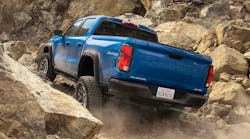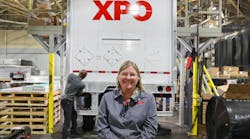Switching tires yields $4,000 a month
Manager: Mike Esfeller
Title: Owner
Fleet: Esfeller Construction, Coden, AL
Operation: Road building and site prep services in Alabama, Florida and Mississippi
PROBLEM
When your truck work in the dirt, their tires take a beating. No rocket science there. Flat-inducing tire punctures are the bane of construction fleet managers. Yet they were virtually unavoidable as trucks operated by Esfeller Construction rolled in and out of job sites.
Founded in 1979 with three employees, Esfeller today employs 100 and operates a fleet of 30 Class 8 power units — 26 Mack dumps and four International tractors — as well as its own sand and gravel pits and a contract hauling operation.
By the time road calls due to flats — most of which were attributed to punctures — were averaging 16 a month, owner Mike Esfeller estimates each call consumed one to two hours of downtime. And at a cost of about $130 per road call for tire service and repairs, plus an average loss of another $130 in payload revenue, flats were easily costing the company about $4,000 a month.
If that wasn't bad enough, many of the damaged tires had to be discarded and could not be retreaded because their casings were damaged. In fact, only about 50% of Esfeller's tires were suitable for retreading.
“Our problem came when our drivers would run over debris at our work sites, lose air and get flat tires,” remarks Esfeller. “These sites are pretty rough on our tires; they're riddled with nails, screws and other pieces of sharp metal. Sometimes it's difficult for our drivers to notice that they have flat tires until they get back out onto the roadway.”
SOLUTION
The job sites were not going to get any tidier, so Esfeller felt he had to look at different tires. He says a local tire dealer suggested switching to the Goodyear G287 MSA tire, which boasts the tire maker's DuraSeal sealant technology.
The key is these tires can keep a truck rolling even after a tire is punctured. What DuraSeal amounts to, according to Goodyear, is a “gel-like, solvent-free compound” built into the inner liner of the tire that “instantly and consistently seals tread-area punctures up to a 1/4-inch in diameter.”
Esfeller says the results were phenomenal. He and company dispatcher Jay Beck immediately noticed a significant reduction in the number of service calls for trucks equipped with the G287s with DuraSeal.
Given that, Esfeller says he began replacing the tires on all of his company's trucks with the DuraSeal product as they came due for replacement. “I am sold on DuraSeal technology because the sealant keeps the air in the tires, and our drivers won't run on flat tires and burn up the casings,” he advises.
According to Beck, adopting the new tires has slashed the number of tire-related road calls from about 16 a month to less than two. He says Esfeller saves nearly $2,000 a month in tire service-related costs and is avoiding another $2,000 a month in lost revenue.
On top of all that, thanks to the DuraSeal tires, the company is now retreading nearly 90% of its tires. And that's saving about $130 per tire over the cost of buying a new one.
“Maintenance Bay” presents case studies detailing how fleets resolve maintenance-related issues.


